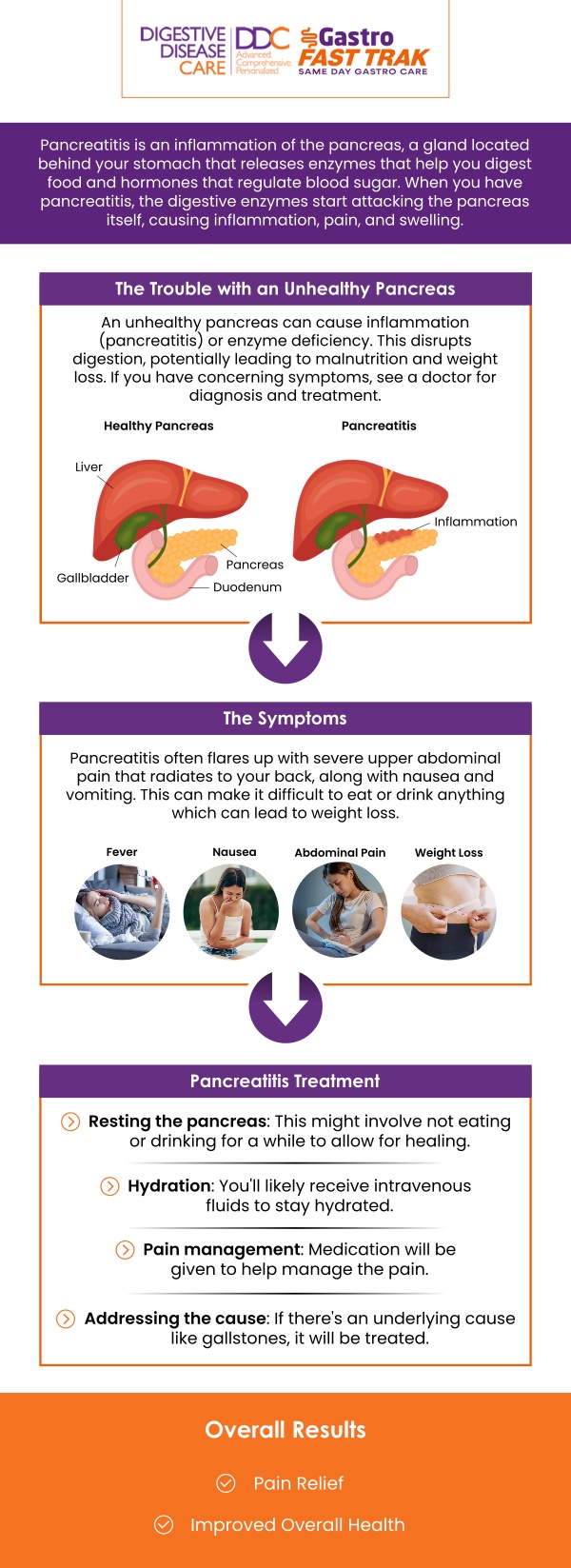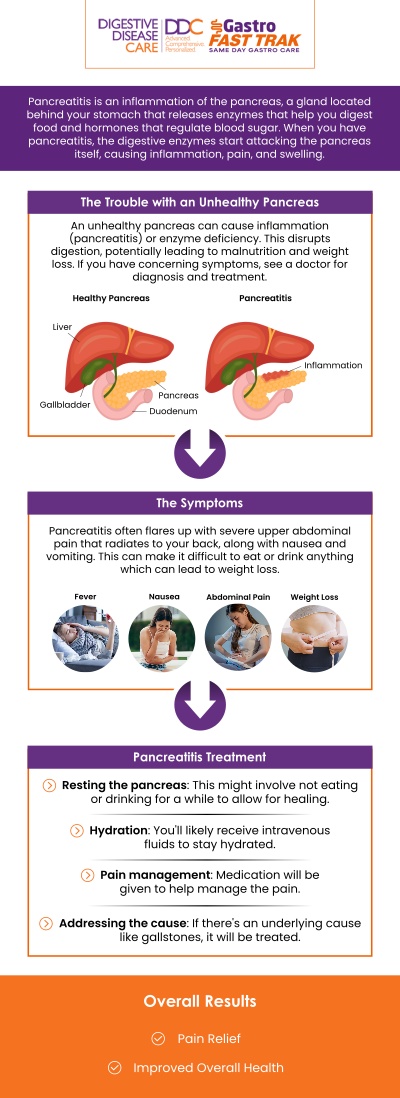Pancreatitis Management in Melville, NY
Pancreatitis management in Melville, NY, is provided by Dr. Preeti Mehta and our board-certified team of gastroenterologists at Digestive Disease Care. We offer personalized treatment plans to manage symptoms, reduce inflammation, and prevent complications. Our comprehensive approach focuses on improving your quality of life through expert care and ongoing support. For more information, contact us today or book an appointment online. We are conveniently located at 150 Broadhollow Rd, Suite 120-B, Melville, NY 11747.


Table of Contents:
Can chronic pancreatitis be managed effectively?
When should I seek immediate medical attention for pancreatitis?
What follow-up care is needed after treating pancreatitis?
How does alcohol consumption affect pancreatitis?
Comprehensive Pancreatitis Care with Dr. Preeti Mehta, MD
Yes, chronic pancreatitis can be managed effectively through a combination of medical treatment, lifestyle changes, and, in some cases, surgical intervention.
Here’s how it can be managed:
1. Pain Management:
• Pain management strategies are tailored to the severity of symptoms and individual patient needs.
2. Enzyme Replacement Therapy:
• Due to the pancreas’s reduced ability to secrete digestive enzymes, enzyme replacement therapy may be prescribed to assist with nutrient absorption and improve digestion.
3. Lifestyle Modifications:
• Dietary changes: A low-fat diet helps reduce strain on the pancreas and improve digestion.
• Avoid alcohol and smoking: Both alcohol and smoking can worsen symptoms and accelerate the progression of the disease.
• Hydration and small, frequent meals: These strategies support digestion and prevent overloading the pancreas.
4. Surgical Intervention:
• In severe cases, surgery may be required to address complications such as pancreatic duct obstruction or pseudocysts.
• Surgical options include draining cysts, removing damaged tissue, or pancreatic resection.
5. Regular Monitoring and Follow-Up:
• Ongoing care with a healthcare provider is essential for monitoring the condition, managing symptoms, and adjusting treatment plans as necessary.
Dr. Preeti Mehta and her board-certified team of gastroenterologists at Digestive Disease Care offer expert care for managing chronic pancreatitis and work closely with patients to improve outcomes and quality of life.
Pancreatitis, an inflammation of the pancreas, can range from mild to severe, and in some cases, it can lead to life-threatening complications. It’s essential to seek immediate medical attention if you experience severe or worsening symptoms that suggest an acute flare-up or complications from pancreatitis.
1. Severe Abdominal Pain:
• Intense, persistent abdominal pain, often described as sharp or stabbing, that doesn’t improve with over-the-counter pain relievers or changes in position should be addressed immediately.
• Pain may radiate to the back or shoulders and worsen after eating.
2. Nausea and Vomiting:
• Persistent nausea and vomiting, particularly if they prevent you from keeping fluids down, can lead to dehydration and electrolyte imbalances, both of which require immediate care.
3. Fever:
• A high fever (above 101°F or 38.3°C) along with other symptoms of pancreatitis may indicate infection or complications such as pancreatic abscess or sepsis, which require urgent medical attention.
4. Rapid Heartbeat and Low Blood Pressure:
• If you experience a rapid heartbeat (tachycardia) or a significant drop in blood pressure, these could be signs of shock, a critical complication that demands emergency care.
5. Jaundice (Yellowing of the Skin or Eyes):
• Jaundice, which presents as yellowing of the skin or the whites of the eyes, may indicate a blockage in the bile duct and requires prompt evaluation.
If you experience any of these symptoms, Dr. Preeti Mehta and her board-certified team of gastroenterologists at Digestive Disease Care recommend seeking immediate medical attention to prevent complications and ensure timely treatment.
After treating pancreatitis, follow-up care is essential to ensure proper recovery, monitor for complications, and manage long-term health. Dr. Preeti Mehta and her board-certified team of gastroenterologists at Digestive Disease Care emphasize the importance of personalized follow-up care tailored to each patient’s needs.
1. Monitoring Symptoms:
• Regular check-ins with your healthcare provider to assess pain levels, digestive function, and overall health.
• Tracking any persistent symptoms or new issues, such as abdominal pain, nausea, or weight loss, is crucial for timely intervention.
2. Nutritional Support:
• Pancreatitis can impair digestion, so ongoing nutritional assessments are necessary. Your doctor may recommend enzyme replacement therapy or dietary changes to support proper digestion and prevent malnutrition.
• A low-fat diet, avoiding alcohol, and eating smaller, more frequent meals can help manage symptoms and promote healing.
3. Managing Underlying Conditions:
• If pancreatitis was caused by factors such as gallstones, high cholesterol, or heavy alcohol use, ongoing management of these conditions is important to prevent future flare-ups.
• Regular screenings and lifestyle adjustments may be required, including cholesterol management or alcohol cessation.
4. Preventing Complications:
• Monitoring for complications such as pancreatic cysts, abscesses, or diabetes is crucial. Follow-up imaging, blood tests, and other evaluations may be needed based on the severity of the initial episode.
With proper follow-up care, the risk of recurring pancreatitis and complications can be minimized, leading to improved long-term health.
• Exacerbates Inflammation: Alcohol can worsen inflammation in the pancreas, making both acute and chronic pancreatitis more severe.
• Accelerates Damage: In chronic pancreatitis, alcohol consumption can speed up the progression of pancreatic damage, leading to scarring • and impaired digestive function.
• Increases Enzyme Production: Alcohol stimulates the pancreas to produce more digestive enzymes, which can be prematurely activated, leading to self-digestion and further inflammation of the pancreas.
• Triggers Flare-Ups: For individuals recovering from acute pancreatitis, consuming alcohol can trigger another episode, leading to more intense symptoms and complications.
• Increases Risk of Complications: Alcohol can contribute to the development of pancreatic cysts, infections, or other serious conditions that may require surgical intervention.
• Affects Digestive Function: Alcohol disrupts digestion and nutrient absorption, causing further complications, such as malnutrition and weight loss.
• Doctors Recommend Abstinence: Dr. Preeti Mehta and her board-certified team of gastroenterologists at Digestive Disease Care strongly advise complete alcohol abstinence for patients with pancreatitis to prevent further damage and improve recovery outcomes.
Dr. Preeti Mehta, MD, and our board-certified team of gastroenterologists at Digestive Disease Care specialize in providing comprehensive care for patients with pancreatitis. With a patient-centered approach, Dr. Mehta offers expert diagnosis, personalized treatment plans, and ongoing support to manage both acute and chronic pancreatitis. Whether through medication, lifestyle changes, or advanced treatments, Dr. Mehta works closely with each patient to address the underlying causes, alleviate symptoms, and prevent complications. Her team ensures that every patient receives the highest standard of care, focusing on long-term management and improving quality of life. At Digestive Disease Care, our goal is to provide tailored solutions that promote healing, prevent flare-ups, and help patients regain their health and well-being.
For more information, contact us today or book an appointment online. We are conveniently located at 150 Broadhollow Rd, Suite 120-B, Melville, NY 11747. We serve patients from Melville NY, Brentwood NY, Farmingdale NY, Huntington NY, Commack NY, Lindenhurst NY and surrounding areas.

Check Out Our 5 Star Reviews


Additional Services You May Like

Additional Services You May Like
- Abdominal Pain
- Acid Reflux
- Barretts Esophagus
- Bloating
- Capsule Endoscopy
- Celiac Disease
- Colon Cancer Screening
- Colonoscopy
- Constipation
- Crohns Disease
- Diarrhea
- Diverticulitis
- Esophageal PH Monitoring
- Fatty Liver
- Fibroscan
- Gallstones
- Gastroenterologist
- Gastric Chest Pain
- Gluten Intolerance
- Hemorrhoid
- Hemorrhoid Banding
- Hepatitis
- Irritable Bowel Syndrome
- Lactose Intolerance
- Pancreatitis
- Polyps
- Rectal Bleeding
- Stomach
- Ulcerative Colitis
- GI Urgent Care





